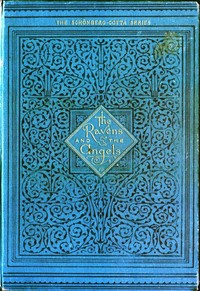The Ravens and the Angels, with Other Stories and Parables by Charles
"The Ravens and the Angels: With Other Stories and Parables" by Mrs. Rundle Charles is a collection of short stories likely written in the late 19th century. The featured narrative, "The Ravens and the Angels," tells the poignant tale of Magdalis, a young mother struggling to care for her two children after the death of her stone-carver husband. The story unfolds against the backdrop of a medieval cathedral, exploring themes of faith,
hope, and the kind of divine provision that resonates through acts of love and sacrifice, particularly represented through the character of young Gottlieb. At the start of the book, we are introduced to the challenges faced by Magdalis as she grapples with poverty, hunger, and the burdens of motherhood. She attempts to shield her children from the shame of beggary while instilling in them a deep understanding of love and faith. The story poignantly illustrates young Gottlieb's internal struggle with hunger and his desire to embody the generosity of angels. As he battles the temptation to consume the last piece of bread meant for his sister, a hopeful prayer—requesting bread from ravens—sets the narrative's emotional tone. The unfolding events reflect the intertwining of divine providence and human experience, ultimately leading to Gottlieb's involvement with the cathedral's choir, which brings both challenges and newfound hope to his family. This opening sets the stage for a rich exploration of spirituality and the human condition, suggesting that even amid adversity, goodness and compassion can shine through. (This is an automatically generated summary.)
Read or download for free
| How to read | Url | Size | |||
|---|---|---|---|---|---|
| Read now! | https://www.gutenberg.org/ebooks/35346.html.images | 473 kB | |||
| EPUB3 (E-readers incl. Send-to-Kindle) | https://www.gutenberg.org/ebooks/35346.epub3.images | 435 kB | |||
| EPUB (older E-readers) | https://www.gutenberg.org/ebooks/35346.epub.images | 439 kB | |||
| EPUB (no images, older E-readers) | https://www.gutenberg.org/ebooks/35346.epub.noimages | 245 kB | |||
| Kindle | https://www.gutenberg.org/ebooks/35346.kf8.images | 591 kB | |||
| older Kindles | https://www.gutenberg.org/ebooks/35346.kindle.images | 562 kB | |||
| Plain Text UTF-8 | https://www.gutenberg.org/ebooks/35346.txt.utf-8 | 426 kB | |||
| Download HTML (zip) | https://www.gutenberg.org/cache/epub/35346/pg35346-h.zip | 419 kB | |||
| There may be more files related to this item. | |||||
Similar Books
About this eBook
| Author | Charles, Elizabeth Rundle, 1828-1896 |
|---|---|
| Title | The Ravens and the Angels, with Other Stories and Parables |
| Contents | The ravens and the angels -- Ecce homo: a story of the year of our Lord one thousand -- The cottage by the cathedral -- The unknown architect of the minster: a legend, not of Cologne -- Only the crypt -- The sepulchre and the shrine -- The cathedral chimes: a legend -- The ruined temple -- The clock-bell and the alarm-bell -- The black ship -- The island and the main land: a sequel to "The black ship" -- The jewel of the Order of the King's Own -- The acorn -- Passages from the life of a fern -- Thorns and spines -- Parables in household things -- "Things using us" -- Sunshine, daylight, and the rock -- Wanderers and pilgrims -- The ark and the fortress -- The three dreams -- Thou and I -- What makes things musical? -- The song without words: leaves from a very old book. |
| Credits | E-text prepared by Peter Vachuska, Chuck Greif, Josephine Paolucci, and the Online Distributed Proofreading Team |
| Reading Level | Reading ease score: 76.5 (7th grade). Fairly easy to read. |
| Language | English |
| LoC Class | PZ: Language and Literatures: Juvenile belles lettres |
| Subject | Christian life -- Juvenile fiction |
| Subject | Conduct of life -- Juvenile fiction |
| Subject | Children's stories |
| Subject | Children -- Conduct of life -- Juvenile fiction |
| Category | Text |
| EBook-No. | 35346 |
| Release Date | Feb 21, 2011 |
| Copyright Status | Public domain in the USA. |
| Downloads | 370 downloads in the last 30 days. |
| Project Gutenberg eBooks are always free! | |

